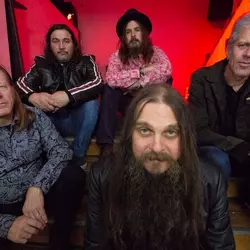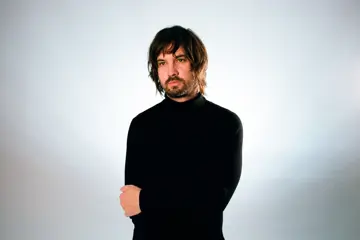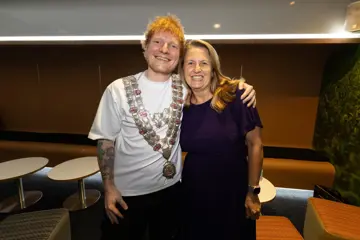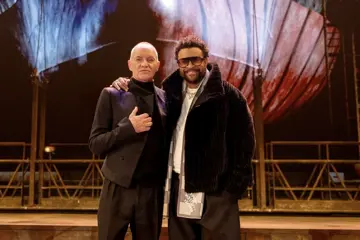 TumbleweedPrecisely 20 years ago a group of long-hairs from the Wollongong region were pretty much owning the heavy guitar scene in Australia, this being a time when the aftershocks from the global grunge explosion were still rippling through the scene and such music was still resoundingly popular. The five guys from Tumbleweed certainly had the ‘grunge look’ down pat – the hair, the denim, the flannel shirts and so forth – but their music was coming from a slightly different source to that springing from the Seattle scene, favouring elements of stoner-rock, psychedelia and of course the Australian underground rock’n’roll that they’d all cut their teeth on.
TumbleweedPrecisely 20 years ago a group of long-hairs from the Wollongong region were pretty much owning the heavy guitar scene in Australia, this being a time when the aftershocks from the global grunge explosion were still rippling through the scene and such music was still resoundingly popular. The five guys from Tumbleweed certainly had the ‘grunge look’ down pat – the hair, the denim, the flannel shirts and so forth – but their music was coming from a slightly different source to that springing from the Seattle scene, favouring elements of stoner-rock, psychedelia and of course the Australian underground rock’n’roll that they’d all cut their teeth on.
So by 1995 the ‘Weed had come to rule the guitar roost in the country – and turn a lot of heads abroad – courtesy their thrilling live show (which had found them opening for Nirvana’s Australian sojourn in 1992), plus their early river of top-notch singles and strong EPs, and the great traction garnered by their acclaimed eponymous debut album in late ’92. In the intervening years they’d toured overseas, been omnipresent on the local festival circuit, put out a couple of high calibre ‘stop-gap’ releases – the Sundial EP and the Daddy Long Legs single both going public in ’93 – and seemed to have the world at their feet in pretty much every way.
The album that came next – 1995’s Galactaphonic – would eventually become renowned as the closest approximation to the ‘Weed’s velvet hammer live caress ever captured in the studio, a snapshot of the warmth and heaviness that always served them so well on stage. It peaked at #6 on the ARIA charts (their highest album placement) and spawned two great singles in Gyroscope and Hang Around; everything seemed to be going to plan, yet by the end of that year the classic line-up had split – the two older members departed, Paul Hausmeister (guitar) was dumped and unceremoniously replaced, and soon drummer Steve O’Brien followed in solidarity – and they would not all share a stage together until the much-publicised reformation in 2009. It was a time of great extremes, survived only by memories and the powerful music they left behind as a legacy.
"We were caught up in this whirlwind and riding it and loving it at the same time."
Now, to celebrate the anniversary of the fantastic Galactaphonic, the album is being printed on vinyl for the first time and also re-released on CD as SuperGalactaphonic, featuring a massive swag of B-sides, demos and live tracks, and the remnants of that classic line-up – sadly five became four last year with the tragic passing of founding bassist Jason ‘Jay’ Curley – are hitting the road to play the album in its entirety (another first for the veteran outfit).
Don't miss a beat with our FREE daily newsletter
“It’s been fun delving back into Galactaphonic, I probably haven’t listened to it since we recorded it – well, since around that time,” smiles frontman Richie Lewis. “There were always songs that we stayed pretty familiar with because we played them all the time, but there was a large section of the album that we never played live and it’s been good rediscovering the record, listening to it again and realising what a good record it was. I’ve been loving it. And also the songs we were familiar with and have in the set every gig, it’s been interesting just listening to them in the context of the album and how the album fits together, so that’s been really cool as well.
“It’s funny how I suppose 20 years passing has given my ears a fresh listen to it and it all seems pretty new, it’s quite vibrant and there’s a lot of energy in it – I think that was really captured well. There were certain songs which at the time I didn’t dig as much as other ones, and that’s sort of reversed so the ones that we didn’t play as much or the ones that were completely not in the set at all because we didn’t like them at the time, we’re actually really, really enjoying playing them live in the jam room so that’s been really awesome; stuff like Feed The River or Medicine and ones like that. So that’s been really cool, songs like Jupiter or This’ll Be The End Of Me are different sorta aspects to our set and our sound and it gives more depth to us.
“It’s amazing how you get used to getting your live set together and you end up picking your favourite ones, and you might have this batch of 25 or 30 songs that you play over and over again for years, and when we actually decided to embark on this process of playing the record from beginning to end and learning all the album tracks we’ve never done it kinda makes me think, ‘Wow, what a waste!’ Because it just gives us more diversity, like this whole aspect of the band that we just weren’t used to in the live context, so I’m really, really looking forward to getting out there and playing the album from beginning to end, it’ll be cool.”
The whole band is apparently enjoying this process of learning the Galactaphonic album cuts, even though a couple challenged and needed slight re-tuning.
“Medicine is a classic example, it’s quite busy as far as guitars go but it was a bit of a throwaway,” Lewis explains. “We’ve kinda changed it live in the practice room, it’s just one that’s really gelled at practice. It’s hard to know why it’s been like that, maybe it’s just approaching it with many years experience? It just seems to work now, I don’t know why. It makes the whole process just a little bit more fun, just doing the Galactaphonic show as opposed to the ‘Weed ‘best of’ type of thing, it’s making it interesting and we’re having a ball with it.”
Back in early 1995 Tumbleweed were top of the world, at least that’s how it seemed from the outside. Lewis paints a picture of a behind-the-scenes portrait that’s not quite as rosy (although they were still living the dream).
“It was a pretty crazy time for us, there was a lot of attention on us and we were really, really busy. We were playing most nights of the week and we were pretty much just living and breathing the band every night and day. After having such a productive first three years doing the EPs, singles and the first album and touring we sorta hit that road that everybody talks about, that ‘second album’ kinda thing. We’d signed up with Atlantic and there was a lot of international pressure for us to record an album that was a decent sort of attempt I suppose at a grunge hit, and they wanted us to do it with an American producer or at least go and record it in America and really sorta give it a go. We had a false start – we weren’t prepared, we were spent, and they sent over a producer Matt Hyde to help us work through it, but it was a little bit too early and we weren’t ready for it.
"We were out of it all the time as well, so it was mayhem! It was absolute fucking mayhem, but we got it done."
“Anyway, we continued playing around and he flew back to America so we had a bit of time to think. We had a few more shows to do, and I can remember we were sitting backstage at The Phoenician Club – and we’d just lost our manager from the early days as well, Chris Dunn, all in this rapid succession – so we sorta felt like we were at the peak of our career at the time, but also we were in this state of fog in a way. We’d given away a lot of our creative control to people in those first years and given it a good hard slog to try to crack the big time, and I suppose we thought, ‘No, look, we wanna do an Australian record. We want to do our record.’ We’d been a bit disappointed with the production on the first album, we thought they’d cleaned it up. We were big fans of ourselves as an early band, being this big fuzzy wah Big Muff live band, and we didn’t think that that side of us was represented on the first album, so Galactaphonic was really a reaction to that – we really wanted to capture the live show, or as close to it as we could.
“We’d recorded Daddy Long Legs with [producer] Paul McKercher and in our opinion he’d gotten closest to what our live sound was like – and he was young and fresh and energetic and he understood our sound – so we wanted to get him. And we wanted to do it somewhere local, so we decided on Trafalgar [Studios] because Hoodoo Gurus had recorded Stoneage Romeos (1984) there and Radio Birdman had recorded Radios Appear (1977) there – two of our favourite classic Australian albums – so we thought, ‘Yep, let’s do that.’ It was against everybody’s advice and whatnot and I think things were still a bit up in the air, I don’t even think we had an Australian record label at that time – we’d jumped ship from Festival and we were still negotiating with every record company in the country, who were all chucking their hat in the ring and anything we wanted at us. We ended up going with Polydor but it was a P&D deal so we sorta still owned that recording and then it reverted into a proper contract after that recording.
“But they were busy times – we were balancing the managerial side of the band, the business side of the band, our future direction, trying to regain control of our creative thing and trying to make it work, and at the same time make the record that we really wanted to make. And also we were out of it all the time as well, so it was mayhem! It was absolute fucking mayhem, but we got it done. The thing is once we got in [the studio] it was two weeks of really productive creativity, from morning to sleep time of just constantly working at it and total engrossment in our thing. And listening back to it after 20 years I can hear all that energy, and if you get to that secret hidden track Interstellar Overdrive, we were all tripping except for Paul! There was one day we finished really early and thought, ‘What are we going to do? Let’s take acid!’, so we took acid just to see what we’d come up with and came up with absolutely nothing, but when Paul rocked up at the end of the day – because he’d had to work that day – we were all in this other world! We got one song out of it, Interstellar Overdrive, and that sums up exactly where we were at the time, pretty much – the whole energy of the band is right in that moment just there, and it’s all sort of just made up as we went along.”
It seems incredible in hindsight that they managed to pull together this great batch of songs while all of this was happening around them.
“As soon as we decided, ‘Ok, this is what we’re going to do, we’re going to do our record and it’s going to be an Australian record and we’re going to take hold of the reins of our band again’, things started to flow a little bit more naturally,” Lewis shrugs. “Lenny came out with Hang Around and we came up with Nothin’ To Do With The Weather, and as they started to come the whole album started to take this personality – it felt natural as soon as we let it happen and stopped being forced into a corner.”
Sadly this decision to do things as they envisaged them and how they felt they should be – which Lewis believes is Galactaphonic’s main strength – cost Tumbleweed the support of their previously bullish American label.
“Yeah, in the end Atlantic dropped us and we ended up just concentrating on Australia after that,” the singer shrugs. “Prior to recording Galactaphonic I suppose the focus on the band’s future would have been more of an international, worldwide one, because Atlantic were sorta pushing this barrow, but as soon as they weren’t involved anymore we concentrated on being in Australia. But there was also a time when Atlantic were sending us around on junkets and I just thought, ‘I don’t wanna do this for the rest of my life, travelling around the world doing that’ – I just didn’t want to do invest that amount of my life into it. But that was me personally, and I really only have that from hindsight – I can remember thinking that – and I reckon that when that thought entered my mind I stopped ‘going for it 100 percent. But I think we got a good few years out of it actually, and I think after Galactaphonic we did the tour and then kinda spiraled out of control for a while after that.”
The album contains some really cool, enigmatic lyrics – typically cryptic as was Lewis’ wont – but the singer explains that there’s a cosmic unifying thread tying them together.
“I listen to the lyrics now and some of them are about the times and the craziness of the times – I was off in another world and I listen back to them and I don’t even know what I was on about half the time,” he laughs. “Thematically it was about the concept of space or about the concept of everything outside being a manifestation of your thoughts and your beliefs and your desires. And I was really into the concept of ‘What is reality?’ and ‘Is everybody’s perception of reality different?’ and ‘What is the difference between individual perception and truth of what reality is?’, so basically they’re the concepts I was mucking around with and I’m still exploring that sort of thing. It all comes across as pretty esoteric, but I just think that the whole theme of Galactaphonic is about ‘space’ being the playing field, and ‘phonic’ being the sound, so thinking and manifesting the sound was really what is was about.”
It must have been strange for the members of Tumbelweed being co-opted into the mainstream for that period without really seeming to court commercial success in any major way. Were there many ‘fish out of water’ moments?
“Yeah, there were a few times when we felt a little bit out of place, conscious of our ripped jeans and feeling a little bit dirty and in place that we shouldn’t be,” Lewis concedes. “But we were caught up in this whirlwind and riding it and loving it at the same time, and still have a strong belief in what we did and still loved our band and our music and were really positive about it. We enjoyed a lot of those experiences as well. We enjoyed meeting a lot of bands who were our heroes or whatever and getting to play at places that we’d only tread about and heard live records recorded at and stuff like that, so ticking those boxes of things you want to achieve was a good thing, but there was certainly things like doing dress rehearsals for TV that were weird.
“For us we come from a working class town and if you’re going to do something you do it once and you do it, and I think if there was one thing that sums up us feeling weird that was doing Hey Hey, It's Saturday I suppose – the actual performance was okay, but doing the dress rehearsals with camera moves was wrong. The camera guy was trying to figure out what we were going to be doing during the performance – would we be moving around and that? – and he goes, ‘Do you just stand there? Are you going to move?’, and I was, like, ‘I dunno, I’ll move when we’re actually doing it.’ And he goes, ‘Well, what are going to do?’ and I’m, like, ‘I don’t know!’ It’s a different sort of mentality – it wasn’t an act. We’re not I suppose classic performers, or ‘an act’ – we just do what we do and we really do it – so trying to move that approach or mindset into their world was really strange for everyone.”














